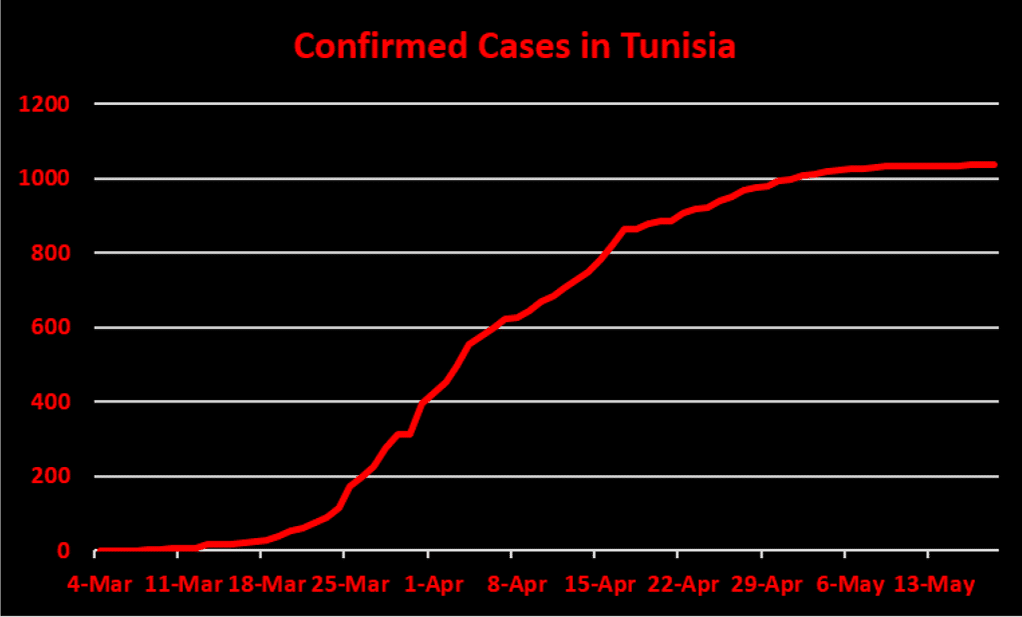May 18, 2020 | Policy Brief
Tunisia’s ‘war against an invisible enemy’
May 18, 2020 | Policy Brief
Tunisia’s ‘war against an invisible enemy’
Tunisia appears to have contained its COVID-19 outbreak despite a weak healthcare system and has begun to ease its anti-virus restrictions. Nine years after the ouster of the Ben Ali regime, successive elected governments continue to demonstrate resiliency, but much work lies ahead.
Situation Overview
On May 10, authorities in Tunis recorded no new COVID-19 cases for the first time since early March. The nation of 11.7 million people has registered 1,037 COVID-19 cases and 45 deaths. In early May, Tunisia allowed half of its government staff to return to work and reopened parts of the transport, food, and construction sectors. Shopping malls and retail stores such as clothing shops and hair salons reopened, too.
After Tunisia reported its first COVID-19 case on March 4, the government acted quickly to contain the virus. Tunisia’s newly elected Prime Minister Elyes Fakhfakh set the tone, declaring a “war against an invisible enemy.” On March 16, Tunisia closed its borders, suspended international flights, and restrict public gatherings. The government imposed a curfew on March 18, at which point Tunisia had reported just 29 coronavirus cases. A nation-wide lockdown began on March 22 as the number of confirmed cases rose to 75.
Tunisia’s military and law enforcement imposed sweeping measures to enforce social distancing and the nationwide quarantine, including army patrols. Police used robots – the “P-Guard” – to confront Tunisians who violated the lockdown in public spaces. Laudably, the army has not exploited the situation by overextending its powers, thus earning widespread popular support.
Buoyed by the positive numbers, the parliament has rallied around Fakhfakh. In April, lawmakers voted overwhelmingly to grant Fakhfakh’s government temporary special powers, allowing it to issue decrees, seek financial assistance, and strike purchasing agreements without first consulting Tunisia’s fractious legislature.
Industry and civil society have also rallied around the flag. 150 workers spent a month voluntarily self-isolating in Tunisia’s Consomed factory, churning out 50,000 face masks per day as well as other protective gear.
COVID-19 in the Greater Middle East
| Country | Cases | Deaths |
| Turkey | 149,435 | 4,140 |
| Iran | 122,492 | 7,057 |
| Saudi Arabia | 57,345 | 320 |
| Pakistan | 42,125 | 903 |
| Qatar | 33,969 | 15 |
| UAE | 23,358 | 220 |
| Israel | 16,621 | 272 |
| Kuwait | 15,691 | 118 |
| Egypt | 12,229 | 630 |
| Algeria | 7,201 | 555 |
| Bahrain | 7,156 | 12 |
| Afghanistan | 7,072 | 173 |
| Morocco | 6,930 | 192 |
| Oman | 5,379 | 25 |
| Iraq | 3,554 | 127 |
| Sudan | 2,591 | 105 |
| Somalia | 1,421 | 56 |
| Tunisia | 1,037 | 45 |
| Lebanon | 931 | 26 |
| Jordan | 613 | 9 |
| W. Bank & Gaza | 386 | 2 |
| Yemen | 128 | 20 |
| Libya | 65 | 3 |
| Syria | 58 | 3 |

Data current as of 1:00 PM, May 18, 2020.
Implications
Despite the low number of cases and the high spirits, Tunisia’s economy is in trouble. It is expected to shrink by 4.3 percent this year, the largest contraction since Tunisia secured independence from France in 1956. According to one estimate, the tourism industry could suffer a loss of $1.4 billion and 400,000 jobs, equivalent to roughly 3.5 percent of the Tunisian population.
The economic pinch has already triggered protests in poverty-stricken areas of the capital. The lockdown has disproportionately hurt Tunisia’s poor and migrant workers, many of whom hail from sub-Saharan Africa. Additional protests by low-wage workers and migrants could resurface due to the bleak economic outlook.
What to Watch for
Tunisia’s efforts to return to some sense of normalcy are crucial for the country. The poor and even the middle class can now begin to generate income again. But it is unclear how the economy will function while some restrictions linger and with tourism still on hold. Meanwhile, jihadi forces will continue to test Tunisia’s security apparatus, which is on alert after thwarting a pair of terrorist attacks in April and May.
More broadly, Tunisia’s fragile democracy is still in the process of building institutions. How the government handles the economic fallout from the COVID-19 crisis will be an important litmus test for the continued solidification of Tunisia’s democratic process.
Benjamin Weinthal is a research fellow at the Foundation for Defense of Democracies (FDD), where he also contributes to FDD’s Center on Military and Political Power (CMPP). For more analysis from Benjamin and CMPP, please subscribe HERE. Follow Benjamin on Twitter @BenWeinthal. Follow FDD on Twitter @FDD and @FDD_CMPP. FDD is a Washington, DC-based, nonpartisan research institute focusing on national security and foreign policy.